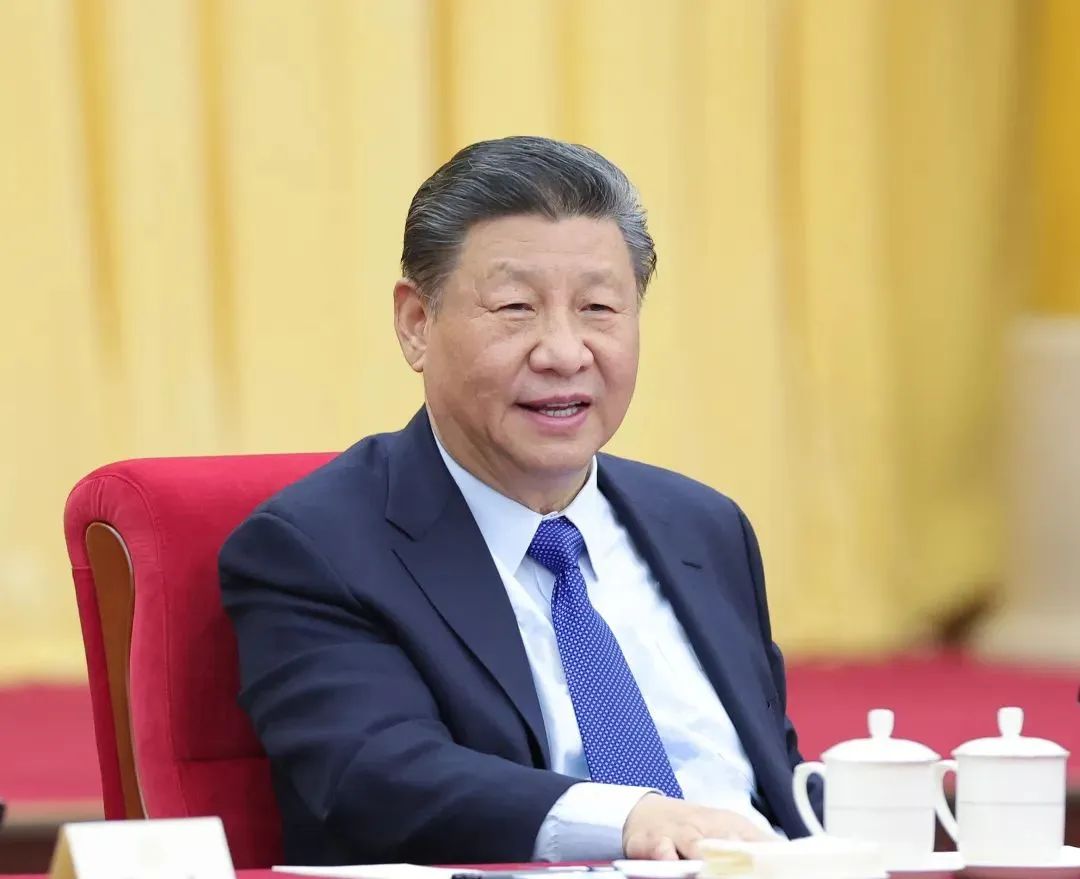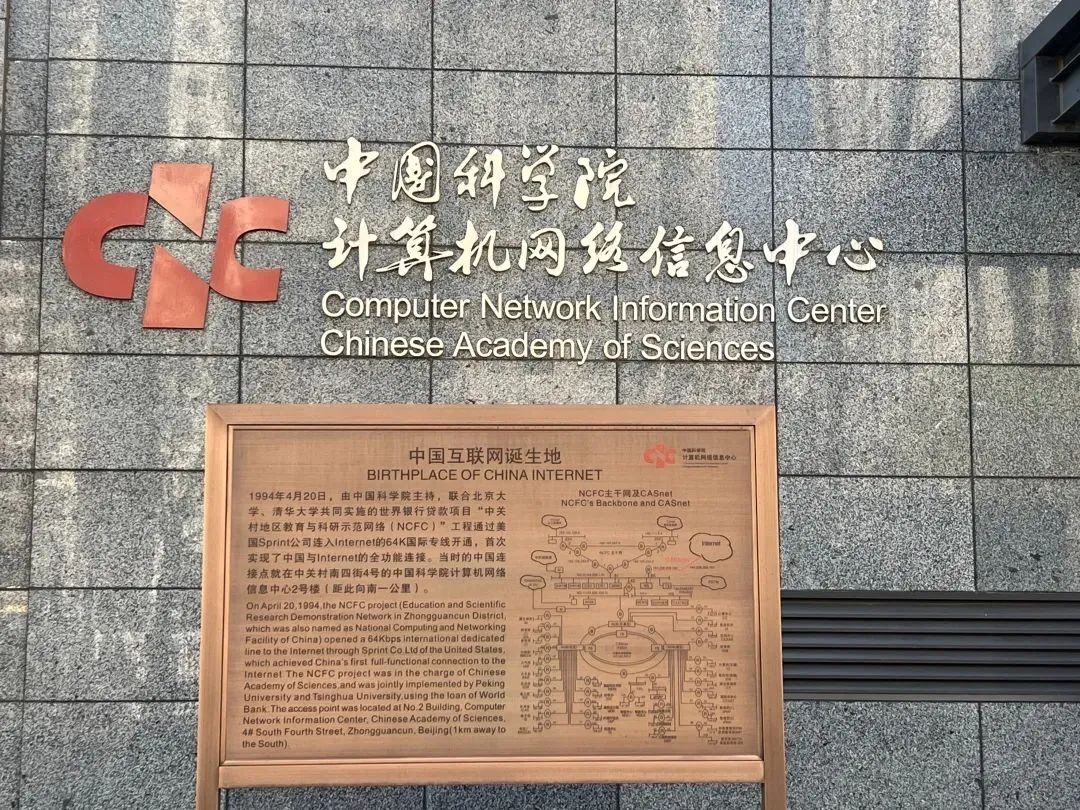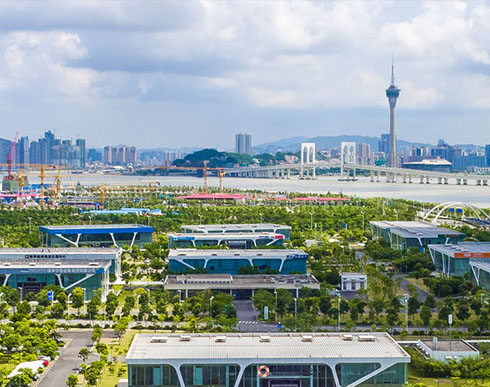2024-10-21
review| Achievements of China's Internet 30th Anniversary
1994On April 20, 2008, a 64K international dedicated line was opened, and China realized full-function access to the Internet, becoming the 77th member of the Internet.
Thirty years ago, it was hard to imagine that the Internet would have changed China so profoundly, closely connected our vast and populous country, and changed the way China interacts with the world so profoundly. Let China and the world become a community with the same breath and common destiny.
Throughout the history of world development, mankind has been expanding the scope of material and spiritual exchanges, which is a surging historical trend. Marx and Engels called it "the transformation from history to world history".
Over the past 30 years, the Internet has changed China, and China has also changed the Internet. Our civilization, which has a long history, absorbs the ideas, technologies and methods brought about by the Internet, the latest achievement of human civilization, and also transforms this "exotic product" with its own powerful civilization genes. let the largest variable of the Internet become the largest increment of career development, deeply into the soil of China, showing vitality.
A man should be independent at the age of thirty. We keenly grasp the opportunities of the times. China's Internet has grown from scratch, from small to large, from dependence to self-reliance. China has begun to make great strides to catch up with and lead the information age.
Over the past 30 years, China has developed into the world's largest Internet market, with the largest number of Internet users and mobile Internet users in the world, built the world's largest and technologically leading network infrastructure, and accelerated the release of the value of data resources. the scale of the digital economy is the second in the world, the key core technologies are constantly breaking through, and digital governance has achieved remarkable results. Over the past 30 years, the building of a community with a shared future in cyberspace has been continuously promoted, which has increasingly become a broad consensus of the international community.
From stumbling to striding forward, we are deeply aware that network security and informatization are major strategic issues related to national security and national development, as well as the work and life of the broad masses of the people. We should proceed from the general international and domestic trend and overall layout, coordinate all parties, innovate and develop, and strive to build our country into a network power.
Over the past 30 years, especially since the 18th CPC National Congress, we have explored a path of Internet development with Chinese characteristics, formed a way to govern the network with Chinese characteristics, and the grand picture of network power has become increasingly clear.
Today, the world clearly hears the sonorous footsound of China in the new era. With the new achievements of building a network power, China is promoting the new development of Chinese-style modernization, working with countries all over the world to move towards digital civilization, and writing a new chapter in the new form of human civilization.

On March 6, 2024, general secretary of the CPC Central Committee, state president, and chairman of the Central military Commission, called on members of the Kuomintang Revolutionary Committee, scientific and technological circles, and environmental resources circles who attended the second session of the 14th CPPCC National Committee, and attended a joint group meeting to listen to opinions and suggestions. General Secretary stressed that "in order to achieve Chinese-style modernization, the Internet must be passed." Photo / posted by Xinhua News Agency (photo by Sheng Jiapeng)
Those who wait for a long time will fly high and take a key step in the forefront of the world.
History sometimes takes a long time to accumulate and wait for a long time to reach the moment of breakthrough.
In front of Building 2 of the Software Park of the Chinese Academy of Sciences in Beijing, a bronze medal clearly records "April 20, 1994", an unusual day for the development of the Internet in China.
At the end of the 20th century, many countries and regions in the world have connected to the Internet, but China has been shut out because of non-technical obstacles, but Chinese scientists have not stopped their efforts.
In early April 1994, Hu Qiheng, then vice president of the Chinese Academy of Sciences, reiterated the requirement for access to the Internet to US institutions in charge of the Internet on behalf of the Chinese side, and the two sides finally reached a consensus. Stephen Wolf, who is in charge of international cooperation on the Internet, recalled: "We quietly opened the floodgates and waited for China to connect to the Internet."
On April 20, 1994, the computer Network Information Center of the Chinese Academy of Sciences connected to the Internet. From this moment on, the Internet era in China has officially begun.

On April 20, 1994, a 64K international special line was connected to the world from the computer Network Information Center of the Chinese Academy of Sciences.
Prior to this, it was the arduous efforts of several generations of Chinese people to move towards an information society.
In 1958, China's first general-purpose digital electronic computer 103 was successfully developed.
In 1979, China's first Chinese character laser phototypesetting prototype was successfully trial-produced.
In 1983, the Chinese character disk operating system (CCDOS) was introduced, which solved the problem of storing and displaying Chinese characters in the computer. In the same year, the "five-stroke font" input method was officially released, breaking through the bottleneck of Chinese character digitization.
In 1986, China launched an international networking project, the China academic Network.
On November 28, 1990, China's national top-level domain name ".CN" was registered.
.
The Chinese, who do not want to be left behind, never give up their efforts to keep pace with the trend of the times; with long steps and even thousands of miles, this effort will bloom into a thousand scenes of the Chinese Internet.
The Internet has now flown into the homes of ordinary people.
After China's full-function access to the Internet, the four major national backbone networks with international export capacity-- China Education and Scientific Research computer Network, China Public computer Internet, China Science and Technology Network, and China Jinqiao Information Network-- have been built and interconnected internationally.
It is these networks that have supported the start of the Internet in China, which is closely linked with the vast sea of the Internet in the world step by step.
When China's first batch of netizens officially touched the Internet, the Internet really began to shift from the intellectual community to the common people.
On May 17, 1995, the 27th World Telecommunication Day, the then communications management agency, the Ministry of Post and Telecommunications, officially announced the opening of computer Internet access services to the domestic community. Beijing Xidan Telegraph Building has set up a business acceptance point, as long as you pay a certain fee and fill in a form, you can become an Internet user.
From this day on, the Internet is no longer a distant dream for ordinary people.
"how far are the Chinese from the information superhighway?"
This question, which has aroused countless people's reverie, gave a "special" answer "1500 meters north" on a billboard on the corner of Baiyi Road in Zhongguancun, Beijing in 1996.
The billboard refers to the online science and education hall of Ying Haiwei, China's first Internet company. Every morning, on the front steps of the Science and Education Museum, a group of young people are sitting on the steps waiting to open the door, looking forward to surfing the Internet here for free. Its launch of "Ying Haiwei time and Space" was the only network in China at that time based on public information services and open to ordinary families.
The Internet is an infinite space full of wisdom and imagination and woven by human beings, which can realize the connection and interaction between people and the world.
In the online forum, as long as there is an account, you can stimulate the text and find recognition. Shuimu Tsinghua, Maopu, West Temple Hutong, Tianya Community, Power Forum and so on have been established and developed rapidly. More and more netizens begin to express their feelings and thoughts on the Internet and become the creators and disseminators of information.
Traditional mainstream media actively embrace the oncoming Internet craze. In January 1995, Shenzhou Scholars magazine entered the Internet to transmit news and information to the vast number of overseas students, and became the first Chinese electronic magazine in China. Two years later, the online version of "People's Daily" (later renamed "people's Daily") was officially launched, which is China's first central key news website, and the central mainstream news media began to stand on the stage of the Internet.
Central news portals such as Xinhuanet, China Network, CCTV Network, International online, China Daily Network and China Youth Network have emerged one after another, and local portals such as Shanghai Hotline and Wuhan Hotline have also begun to compete for the Internet wave.
In the Internet era, when ordinary people go online, public opinion is also on the Internet.
In 1999, the "Government Internet Project" was launched, and China's e-government took solid steps. In March 2006, the National General Framework for E-Government was issued. Governments at all levels release information and understand public opinion through the Internet, which has become a new fashion for the government to be in power.
Fast and simple interactive communication platforms such as blog, Tieba, Douban, Xiaonei (later renamed "Renren") and Weibo have brought about a change in the way of communication and burst out the force to promote social progress.
From bloggers reporting "dam break cover-up" incidents, to forum posts revealing "overseas study tours", to Weibo exposing "cousins" and "uncle Fang". Chinese netizens use the tools of chat and entertainment creatively, and network participation in politics has become a new fashion of democratic politics in our country.
The Internet has set up a direct communication bridge between the government and the public. Learning about the people and gathering the wisdom of the people through the Internet has become a new channel for the Chinese government to govern for the people and connect with the masses.
Internet business process starts
The Internet has built a flat world in which information and data flow each other, bringing a huge new commercial space.
In 1995, the beginning of global Internet business, the listing of Netscape in the United States opened up people's business imaginations about Internet companies. Chinese Internet entrepreneurs began to connect and catch up with the world with great passion.
A young returnee doctor returned home and founded Ericsson, the predecessor of Sohu, who occupied an important seat in the era of PC portals.
NetEase founded and took the lead in launching the free e-mail service. NetEase mailbox popularized the concept of e-mail to many people.
Founded in Shenzhen, Tencent launched China's first instant messaging tool, OICQ.
BaiduThe company was founded in Peking University Resource Hotel.
.
Too many moments that seemed inconspicuous at that time have become a far-reaching opening later.
The rise of Sohu, Sina and NetEase has become an entrance for countless netizens to enter the Internet world and roam the ocean of information. QQ, an instant messaging software, allows a penguin to write a new experience of online communication among Chinese people.BaiduPromote the popularization of search engine technology in China and greatly improve the efficiency of netizens' access to information. With advanced applications and rich content, an unprecedented and broad Internet space is unfolded in front of people.
"are you GG or MM?" This is the most common question asked by young people who are new to the Internet when they start a chat on QQ.
At the west gate of the Capital Gymnasium, Shihuakai, China's first online coffee shop, opened. Since then, "Internet cafes" have quickly become popular across the country.
Twenty students from Fudan University in Shanghai received the first distance teaching in China through a PC, a modem and a telephone line.
The 43-episode TV series Outlaws of the Marsh, broadcast in prime time on CCTV, went online and was warmly welcomed by netizens.
.
At a time when the "magic" of the Internet is constantly being discovered, the speed of the Internet has perplexed netizens.
In 1997, the China Internet Network Information Center (CNNIC) released the first Statistical report on the Development of China's Internet. The survey shows that 49.1% of people are disappointed with the speed of the Internet, while 36.2% think the Internet fee is too high.
Soon, a new technology brought good news. On the eve of National Day in 1999, a Mr. Wei in Shanghai spent 1500 yuan to install ADSL (asymmetric Digital subscriber Line). For people who have become accustomed to using telephone lines to dial up the Internet, broadband feels like flying. "No adjective can describe the feeling of speed."
After the official commercial use, the price of ADSL has fallen rapidly, and home users only need to pay 100 to 200 yuan per month to install ADSL broadband. With faster Internet speeds and cheaper prices, broadband networks are rapidly gaining popularity in China. In 2005, the number of broadband access users in China reached 37.35 million, surpassing the scale of dial-up users for the first time, indicating that broadband has become the main way for users to access the Internet.
The innovation and application of technology promotes the innovation and enrichment of business models.
Since 1998, a large number of e-commerce websites in China have sprung up like bamboo shoots after a spring rain: Alibaba, an e-commerce company serving small and medium-sized enterprises, was founded in Hangzhou; Dangdang, which started as book sales on Zhongguancun South Street in Beijing; also in Zhongguancun, JD.com was founded and officially set foot in the field of e-commerce six years later. In the vast volume of the development of the Internet in China, the process of e-commerce has begun.
With China's e-commerce entering a period of rapid growth, complete e-commerce application support systems such as commodity information acquisition, payment security, logistics and distribution have been gradually formed.
The Mobile Dreamnet project has spawned a series of Internet applications such as "Mobile News", "Mobile greeting Cards", "Mobile QQ", "Mobile stocks" and "Mobile Games", which makes Chinese Internet companies that have experienced the Internet bubble at the turn of the century see the dawn of the future. In 2003, the three major portals of Sina, Sohu and NetEase ushered in full-year profits for the first time; in 2004, Shanda, Tencent, Air China, 51 job and other Internet companies listed overseas one after another. Chinese Internet companies began to emerge in the world. In 2007, Tencent,BaiduAlibaba's market capitalization has exceeded 10 billion US dollars, and Chinese Internet enterprises have become one of the largest Internet companies in the world.
.
People are more and more aware that the Internet is far more unknown than known, it contains huge energy, continuous rapid iteration, rapid fission.
From the matchbox-sized "BB machine" in the 1G era and the fashionable "mobile phone" to the black-and-white screen phone that can only store 200 text messages in the 2G era, to the "touch screen + application" smartphone in the 3G era has greatly revolutionized the way of communication. Technology, products and applications promote each other, forming a surging wave of the rapid development of the Internet.
In 2009, China's 3G license was unveiled, and the three technology standards were adopted by China Mobile, China Telecom and China Unicom.
In 2011, Xiaomi, which was founded more than a year ago, released the first generation of mobile phones. In the same year, Motorola, a communications giant that once roared the world, ended.
Once you miss it, it's hard to get the chance back. From operators to mobile phone manufacturers to PC manufacturers and Internet companies, no one wants to miss the fast train to the future.
With the rapid development of mobile Internet, the scale of Chinese netizens has increased significantly, and the devices for netizens to access the Internet have become more diversified. By the end of June 2012, the number of Internet users using mobile phones to surf the Internet in China exceeded that of desktop computer users for the first time.
The Internet has finally come to everyone's fingertips.
Mobile Internet has given birth to a new business model, and numerous new applications new business type have emerged from the ground like a new species and are rising rapidly.
Ride-hailing software such as Didi subverts the concept of roadside car-hailing, and online car-hailing has gradually become an important way of travel.
Wechat and so on set off a new upsurge of social media, netizens have started to do "WeChat business", and social relationships have brought new business marketing models.
Short video applications such as Douyin and Kuaishou have sprung up rapidly, with explosive growth in the size and duration of users.
The Internet ordering model brought by Meituan and Enliamo has injected new business opportunities and vitality into the traditional catering service industry, and has gradually changed people's living habits and consumption patterns;
Pinduoduo and others rely on agricultural products and social fission to achieve e-commerce breakthrough.
In the past, when people read Digital Survival by Nicholas Negroponte, an American scholar, they thought it was a science fiction book, but now the Internet has been truly integrated into all aspects of our social life.
In Xizang's Zhaxi hometown, which is 4119 meters above sea level, post-90s Shaanxi boys have opened the highest online express store in the world, serving more than 7400 local farmers and herdsmen, with direct delivery to the base camp of Mount Qomolangma.
Chen Siying, a visually impaired girl in Shanghai, can also enjoy the daily life of ordinary people with the help of smartphone screen reading software.
.
From 0 to 1, and then from 1 to infinity, renovating, growing and inclusive, the Internet has reshaped the Chinese way of life, changed the traditional way of work, and gave birth to many new scenes of new business type. The ordinary people in the Internet, like bytes, are connected to each other and become the brilliant stars of the Chinese Internet.
Promote the healthy development of Internet norms
Since then, China has issued a number of laws and regulations, such as the measures for the Management of Internet Information Services, constantly standardizing the innovation and development of the Internet in China.
The "old cyber" who came into contact with the Internet in the early days must have both beautiful and bitter memories of the network at that time. At that time, the Internet was like a city that had just been built, refreshing all the time. But at the same time, viruses, illegal plug-ins, fraud, number theft and other chaotic phenomena continue to impact people's online experience. According to statistics, China received 2700 Internet crimes in 2000 and reached 14000 in 2004, and maintained a rapid growth trend.
As early as 1997, the Ministry of Public Security promulgated and implemented the measures for the Security and Protection of International networking of computer Information Networks, which extended the security of computer information systems to the network field. In 2005, in order to change the lag of technical measures for security protection of Internet service units and networking units as soon as possible, and to ensure Internet network security and information security, the Ministry of Public Security formulated and promulgated the provisions on Technical measures for Internet Security Protection.
In 2009 and 2015, China adopted amendments to the Criminal Law to establish the crime of infringing upon citizens' personal information and strengthen the criminal law protection of personal information. In the special legislation on the Internet, the decision of the standing Committee of the National people's Congress on strengthening the Protection of Internet Information adopted in 2012 makes it clear that the State protects electronic information that can identify citizens' personal identity and involve citizens' personal privacy.
In 2008, China ranked first in the world with 253 million Internet users, and ".CN" became the largest national top-level domain name in the world. By the end of 2013, China had more than 1.2 billion mobile phone users, 80% of whom surfed the Internet through mobile phones, 300 million online shopping users, and more than 10 trillion yuan in e-commerce transactions.
China firmly seizes the opportunity of the development of informatization, inserts the wings of the Internet that soar all over the world, and becomes a veritable "network power".
Raise the flag for orientation and sound the charge for the construction of a network power.
In the past 300 years, from "steam revolution", "electrical revolution" to "information revolution", every industrial revolution has greatly liberated the productive forces and promoted earth-shaking changes in human society. and profoundly changed the global economic pattern, interest pattern, security pattern.
At present, the changes of the world, the times and history are being carried out in an unprecedented way. The Internet has brought a series of new development opportunities and risks and challenges. Informatization has become the key engine to drive and lead the high-quality development of economy and society. Network security has become one of the most complex, realistic and serious non-traditional security issues facing our country.
"without network security, there will be no national security, and without information technology, there will be no modernization."
"in today's world, those who master the Internet will grasp the initiative of the times; those who despise the Internet will be abandoned by the times. To a certain extent, it can be said that those who get the Internet will win the world. "
This is not only a historical opportunity that must be seized, but also a challenge of change that must be faced.
On 27 February 2014, the Central leading Group on Cyber Security and Informatization (later changed to a committee) was established. At the first meeting of the Central Cyber Security and Informatization leading Group, General Secretary put forward the goal vision of "striving to build China into a cyber power" for the first time.
At that time, the number of netizens in China reached 700 million, and the General Secretary stressed, "this is a remarkable number and a remarkable achievement."
The Internet has increasingly become a new space for people to study, work and live, and a new platform for access to public services. 5G, big data, artificial intelligence and other technological innovation and development are becoming a new driving force. People feel that a new wave has become unstoppable.
The popularization of network infrastructure is accelerating, and the people's sense of acquisition is increasing.
Si Longbazhen lives in Ai Xi Xiang Gang Cun, Karuo District, Changdu City, Xizang Autonomous region. Surrounded by snow-capped mountains, the temperature is low and the network signal is poor. In order to find a stable signal for online lessons, she climbed the snow-capped mountains for 30 minutes.
"Post-1995 girls looking for online classes on the top of the snow mountain" has been a hot search, netizens have said: the appearance of finding a net to study hard on the top of the snow-capped mountain is the most beautiful gesture of youth.
Subsequently, staff from the Mobile Company in Changdu City, Tibet Autonomous Region quickly rushed to the girl's village to carry out signal improvement work, build a 4G base station, and realize video calls and online learning in a few days.
With overlapping peaks, vast forest and rough waves, this is Dulongjiang Township, Gongshan Dulong Nu Autonomous County, Nujiang Lisu Autonomous Prefecture, Yunnan Province, which has been plagued by poverty for a long time.
Erecting optical cables, climbing towers, installing equipment, testing signals, etc. On the banks of the surging Dulong River, communication equipment is transported bit by bit into the depths of the mountains. In April 2014, the 4G base station was completed and opened, and in 2019, the 5G pilot base station was also successfully completed and opened.
"compared with cities, the construction of Internet infrastructure in rural areas is our deficiency." Let hundreds of millions of people have more sense of achievement in sharing the fruits of Internet development, General Secretary Nianzi.
Since the 18th CPC National Congress, the Internet infrastructure has been rapidly extended to remote rural areas. China's existing administrative villages have realized "village-to-village broadband", 5G network covers all prefecture-level cities and county cities, and "county access 5G". As of December 2023, the Internet penetration rate in China's rural areas reached 66.5%, the total number of rural broadband users reached 192 million, and the number of rural Internet users reached 326 million.
From the snowy plateau to the border islands, from the stony desert to the depths of the mountains. The spring breeze of helping the poor through the network has brought Shenzhou Mountain Township to life. With the availability of broadband, the newly released policies for benefiting the people and the most advanced technical information can reach the fields directly; the information is "smart", and the market conditions of the whole China and even the world are under control; e-commerce has come, and agricultural and special products hidden in "deep alleys" have begun to "become famous all over the world."
At the exhibition of sculptures in the National Museum of China, a sculpture left a deep impression on people: two rural old people sat happily on the stone mound at the head of the village, holding their mobile phones high and making video calls with their relatives far away from home. Sculpture defines the specific moments of our digital life, and today, the "digital" tentacles are increasingly extended to every corner of China.
In the communities of Junmen, Zhongshan and Qingcheng, Gulou District, Fuzhou City, Fujian Province, relying on the "Gulou Intelligence brain" and through the data of "access control" and "water and electricity" on the intelligent community platform, the living conditions of the elderly are analyzed, and the abnormal situation is dealt with in real time. The "smart water meter" has become a "safety valve" to guard the elderly living alone 24 hours a day.
"the bell." A prompt bell rang from the internal medicine clinic of Bayi Hospital in Yushu Tibetan Autonomous Prefecture, Qinghai Province. Zhao Zhixi, director of the intensive care unit, picked up his cell phone and connected to the video call. at the other end of the camera, a doctor and patient assisted him. After several professional inquiries, Zhao Zhixi made a diagnosis. The "two-way referral" system allows small screens to connect with the deep sharing of medical resources.
"now it is very convenient to set up outdoor signboards online, there is no need to upload all kinds of documents, and it is very fast, which is too friendly to our entrepreneurs." Mr. Zhang handled the outdoor signboard setting for the record at the Administrative Service Center of Jiulongpo District in Chongqing. after logging in, he found that the name, ID card number and other information had been filled in automatically. You only need to choose the type and you can complete the process. there is no need to provide any materials throughout the process.
.
Internet + village, Internet + community service, Internet + public life, Internet + rural government affairs, any combination is refreshing the Chinese dream.
In one minute, mobile payments completed 287700 payments; in one minute, more than 200000 parcels shuttled across China.
In one minute, 61 cases were "handheld" through the Internet. This is the real scene in which China is full of vitality and steaming.

On November 8, 2023, in Qianyuan Town, Deqing County, Huzhou, Zhejiang Province, the intelligent sorting robot "Little Yellow Man" is working in the first Industrial Intelligence Logistics Park.
"China has built the world's largest and technologically advanced network infrastructure", "China has become the largest online retail market in the world for 11 consecutive years", and the coverage of the national telemedicine service platform has reached 100% at the prefectural and municipal level. " This is the largest digital society in the world with rich and diverse digital application scenarios. Groups of eye-catching data have become a strong witness to the stride towards a cyber power.
Continuous breakthroughs in information core technology to enhance the initiative of Internet development in China
South of Zijinshan Mountain, by the banks of Kowloon Lake. The Zijinshan Laboratory in Nanjing, Jiangsu Province, which brings together more than 1000 industry experts and university teachers and students, is challenging the peak of research and development of 6G network communication technology.
On July 6, 2023, General Secretary came here to learn more about tackling key problems in major scientific and technological tasks.
Academician Liu Yunjie reported to General Secretary: "I have handed in my homework to you today. It is a bit difficult, and it took us a long time to finish it."
Nine years ago, General Secretary inspected Jiangsu Industrial Technology Research Institute in Nanjing and listened to Academician Liu Yunjie's report on R & D work. Today, Zijinshan Laboratory has made a series of world-leading achievements in the future network, B5G/6G communications, network security and other fields, and created a number of important achievements in the field of network communication and security.
General Secretary stressed: "the real heavy weapon of a great power must be in our own hands." the core technology of the Internet is our biggest 'lifeline', and the control of core technology by others is our biggest hidden danger.
In order to grasp the initiative of Internet development in China and ensure Internet security and national security, we must break through the difficult problem of core technology.
Traveller Friendship Hostel, Beijing, March 6, 2024.
General Secretary cordially called on the members of the Revolutionary Committee of the Kuomintang, the scientific and technological circles, and the environmental resources circles who attended the second session of the 14th CPPCC National Committee and attended the joint group meeting. The General Secretary stressed: "to achieve Chinese-style modernization, the Internet must be passed."
Entering a new era, China has seized the opportunity to speed up breakthroughs in core technologies in the field of information: accelerated development of software and integrated circuit technology, in-depth application of domestic operating systems, and original breakthroughs in the fields of quantum communication and quantum computing; the total number of top 500 supercomputers in the world has been ranked first for many years. Important achievements have been made in tackling key common technologies, such as high-end chips, basic software and core components, and global competitive advantages have been formed in some areas.
In 2023, a survey by Nippon Keizai Shimbun showed that the quantity and quality of Chinese research papers ranked first in the world in the field of artificial intelligence (AI). In December 2023, the Institute of Global Innovation and Development of East China normal University released the Top 100 Global Science and Technology Innovation Center (2023). The evaluation shows that 23 of the top 100 global science and technology innovation centers are from China.
In today's world, whoever has mastered the Internet will grasp the initiative of the times. Since the 18th CPC National Congress, China has persisted in putting scientific and technological self-reliance at the core, seizing the first opportunity of global scientific and technological development with a sense of responsibility, mission, and urgency, strengthening key core technologies to tackle key problems, and speeding up the building of an innovation system that supports technological and industrial development, providing solid technical support and strategic guarantee for the construction of a network power.
Take advantage of the wind and digital economy and develop forward through the waves.
Click the mouse and sketch your fingers. Billions of data flows and interweaves into an invisible web. The Internet is playing an unprecedented important role on the stage of China's economy.
As night fell, villagers in Xingxi Village, Donghai County, Lianyungang City, Jiangsu Province began the busiest time of the day. In just four hours, Li Zhongliang, a villager of Xingxi Village, sold thousands of dollars worth of crystal products to British customers via webcast.
Today, like Li Zhongliang, villagers in Xingxi Village in Donghai County have increased their sales income several times through live webcasts. By vigorously developing new business type's new models such as "Crystal + cross-border e-commerce live broadcast", the county's e-commerce network retail sales alone exceeded 28 billion yuan in 2021. The change of Xingxi Village is a vivid epitome of the achievements of Internet construction in our country.
Fast and efficient network connects villages with the world, and the digital economy and Internet economy have also entered the rural streets.Rural e-commerce industrial park, agricultural Internet of things, live broadcast with goods. The Internet has frequently borne fruit in rural areas, and a number of new business type and new applications are springing up like bamboo shoots after a spring rain. The network activates the great potential of rural revitalization. For the whole year of 2023, China's rural online retail sales reached 2.49 trillion yuan.
In Yiwu Commodity City, Ren Xiaoling, founder of Yiwu Yuandi Stationery Company, completed another product video shoot and uploaded it to the Yiwu International Trade City (Chinagoods) platform. "from offline to online, it is the common choice of merchants in the Commodity City." Ren Xiaoling said.
Chinagoods, which was launched at the end of 2020, is a new online platform launched by Yiwu Commodity City. It not only provides "through-train" services for purchasing, shipping, tax declaration and money return, but also provides merchants with international warehousing, logistics, payment, booking and other trade services. Once launched, it is welcomed by merchants, and the total value of commodity transactions on the platform reached 16.8 billion in 2021.
Since 2009, "Singles Day" shopping has stepped onto the stage of Internet history and become the largest commercial activity on the Internet in China. During the "Singles Day" in 2023, in JD.com, more than 600 intelligent delivery vehicles took to the streets in one minute; in Cainiao, a single unmanned wisdom warehouse could handle 800 items in one minute; in Shun Feng, nearly 100000 parcels were transferred in transit in one minute.
Countless pieces come together in one minute, resulting in a total of 132.07 billion pieces of express delivery business and more than 15 trillion yuan of online retail sales in 2023.
For a hundred years, oil has pushed the world of the industrial age forward. Today, in the Internet era, the new "oil"-data, contains huge new momentum.
As early as July 17, 2013, in his important speech during his inspection tour of the Chinese Academy of Sciences, General Secretary profoundly revealed big data's important strategic role in the development of today's world. The General Secretary pointed out: "the vast data ocean, like the oil resources of an industrial society, contains huge productive forces and business opportunities. Whoever has mastered big data's technology will master the resources and initiative for development."
On December 8, 2017, when the political Bureau of the CPC Central Committee held its second collective study on the implementation of the national big data strategy, General Secretary profoundly pointed out that "it is necessary to build a digital economy with data as the key element."
The Fifth Plenary session of the 19th CPC Central Committee proposed to develop the digital economy, promote digital industrialization and industrial digitization, promote the deep integration of the digital economy and the real economy, and create an internationally competitive digital industry cluster.
From "promoting the accelerated growth of the digital economy" in 2017 to "vigorously developing the digital economy" in 2023, and then "deepening the innovative development of the digital economy" in 2024, every update of the expression of "digital economy" in the Government work report conveys China's unswerving new thinking and deployment for the development of the digital economy.
A senior McKinsey managing partner said frankly: "China's Internet economy is leading the world and growing at an astonishing rate."
In just a decade, the scale of China's digital economy has grown rapidly from 16.2 trillion yuan in 2014 to 50.2 trillion yuan in 2022, and the share of GDP has also increased from 25.1% to 41.5%. Digital economy is becoming the field with the most active innovation, the fastest growth rate and the most extensive influence in China.
In Beijing, the "Changan chain" team launched Hong, the largest block chain open source storage engine in the world, and the 3.0 phase of the high-level self-driving demonstration zone started construction; in Shanghai, 8 municipal digital transformation demonstration zones were unveiled, 25 digital life benchmarking scenes were accelerated, and the smart city digital base was further consolidated. By the end of 2022, Chongqing had gathered 1900 enterprises in the core industries of the digital economy above scale, with the added value of the core industries of the digital economy reaching 220 billion yuan, and more than 115000 enterprises of "Shangyun, Utility and Intelligence".
The bright "report cards" highlight the strong resilience and momentum of China's digital economy.
In China, as the leading force of innovation-driven development, the Internet is changing the mode of economic development with unprecedented breadth and depth, and the degree of integration with economy and society is getting higher and higher. China has created a huge application scene for the development of the Internet.
By the end of 2022, the number of mobile animal Internet terminal users in China had reached 1.845 billion, becoming the first country in the world's major economy to achieve "thing Superman". "Internet +" is undergoing "chemical reactions" with various industries, and powerful and dynamic applications such as the industrial Internet and intelligent agriculture continue to emerge. With the accelerated integrated development of digital technology and real economy, the digitization, networking and intelligence of manufacturing, service and agriculture have been continuously upgraded, and a number of new digital industries, new business type and new models have emerged. we will promote China's industry to move towards the middle and high end of the global value chain.
Build a strong security barrier and guard the clear cyberspace
As the new picture of Internet writing, production and life continues to spread, "hidden threats" follow.
The Beginning of Autumn, Mr. Li, who lives in Haidian District, Beijing, received the bike he bought online early in the morning. This is a very satisfactory online shopping experience.
However, what happened next made him feel very helpless. Since he searched and browsed bicycles, several App have frequently recommended related products. "it makes people feel like they have been leaked and spied on."
While the digital economy is booming, "big data kills the acquaintance", and "Issues such as "information cocoon room", App "eavesdropping" and "privacy disclosure" also follow, causing people's concern.
A student was cheated out of nearly 5000 yuan. " In the second half of 2023, the Jilin Provincial Post for the Protection of Youth Rights and interests and the police of the Shuangliao Branch of the Expressway Public Security Bureau of the Provincial Public Security Bureau received a phone call. It turned out that when a student Yang Le (a pseudonym) was browsing a short video, he saw that someone claimed to be able to crack the "anti-addiction system" of the game, so he added the contact information of the other party. Under the coaxing of the other party, Yang Le unwittingly transferred nearly 5000 yuan.
This is a new type of telecom network fraud aimed at minors. Personal information disclosure, telecom network fraud, network hacker attacks. More and more network security risks have a direct impact on public life.
"Security is the premise of development, development is the guarantee of security, and security and development should be promoted at the same time." General Secretary has repeatedly stressed the need to correctly handle the relationship between development and security.
In 2014, "maintaining cyber security" was written into the "Government work report" for the first time at the two sessions of the National people's Congress.
In November 2016, the Cyber Security Law of the people's Republic of China was promulgated, which is the first basic, framework and comprehensive law in the field of cyber security in China. It has made clear provisions on the protection of personal information, the control of network fraud, and the implementation of the network real-name system, which has become an important milestone in the construction of the rule of law in cyberspace in China.
In recent years, China has successively promulgated laws and regulations such as the Electronic Commerce Law of the people's Republic of China, the data Security Law of the people's Republic of China, the personal Information Protection Law of the people's Republic of China, and the regulations on the Security Protection of critical Information Infrastructure. "Internet News and Information Service Management provisions", "Network Information content Ecological Governance provisions", "Network Security Review measures" and other departmental rules And normative documents such as the measures for Security Assessment of Cloud Computing Services, the regulations on the Management of Network Audio and Video Information Services, and the regulations on the Management of Public account Information Services for Internet users. The "four pillars and eight pillars" of China's network legislation has been basically constructed, and the process of rule of law in cyberspace has been further promoted.
China's network law enforcement has been continuously strengthened, anti-monopoly, personal information protection, and juvenile protection have been carried out in depth; network justice has been continuously deepened, Internet courts have been established, intelligent courts and digital procuratorates have been accelerated, and cyber crimes have been punished in accordance with the law. the popularization of the law on the network has been promoted in an all-round way, and the literacy and concept of the rule of law on the network have been continuously strengthened.
Focusing on improving the network security awareness and protection skills of the whole society, China has held the National Network Security publicity week for 10 years in a row, and has continuously carried out a series of special actions to deal with the outstanding problems such as "rice circle" chaos, network violence, self-media chaos and so on. The "opinions on speeding up the establishment of a comprehensive network management system" and "opinions on strengthening the construction of network civilization" have been formulated and implemented, and the network comprehensive management system has been speeded up. With civilization to protect the beautiful spiritual home on the Internet, China's cyberspace is becoming more and more clear.
The Internet in China is an open and cooperative Internet, an orderly Internet, an Internet full of positive energy, and an Internet that benefits the people. Since the 18th CPC National Congress, under the scientific guidance of the strong leadership of the CPC Central Committee with Comrade at the core and General Secretary's important thoughts on the network power, the Internet information cause has changed from ramming the foundation to becoming a strong trend, from development to continuous growth. A series of strategic measures have been taken to promote a series of transformational practices, achieve a series of breakthroughs, and achieve a series of landmark achievements. Historic achievements and historic changes have taken place in the cause of Internet information, which is a true portrayal and vivid embodiment of the great changes in the decade in the new era.
Set sail bravely, stand up the tide of the times bravely
The 30 years of China's full-function access to the Internet has been 30 years of independent innovation, opening up and cooperation. Adhering to the concept of joint discussion, co-building and sharing, China is changing from a beneficiary of global Internet development to a contributor and leader of global Internet development.
If you know each other far away, there is no deep sea of clouds.
The Internet provides a new platform for mutual learning and communication among civilizations, enabling people to overcome obstacles, gather in the clouds, and collide with each other.
"recently, I was infatuated with a short play. Although each episode is only one minute, I can't stop watching it. Who is going to take my phone?" This is the "complaint" of an overseas audience on the social platform. And this short play that she can't stop comes from China.
In 2023, an app called "Reel Short" became one of the most popular apps in the United States, according to Sensor Tower, a US mobile application data analysis company. The software, which is "unknown" in China, is built by Chinese companies and targets the overseas short drama market.
Chinese online literature also has a lot of fans overseas. According to the 2023 report on the going out trend of Chinese online Literature, the overseas revenue of the whole industry of Chinese online literature reached 4.063 billion yuan in 2022, an increase of 39.87% over the same period last year. China Literature's overseas portal "starting Point International" launched about 3800 translation works of Chinese online literature, trained about 410000 overseas original writers, launched about 620000 overseas original works, and visited about 230 million users.
Chinese online games are also outstanding overseas. With the advent of the Lunar New year in the year of the Dragon, the popular open world adventure game "original God" synchronizes with the Chinese New year. In the "original God" world, the "Sea Lantern Festival" is synchronized with the Chinese Spring Festival. Global players can experience the strong Chinese style of "Colored Harrier Spring Wind" in the game world.
China has made its own voice through the Internet, and the world has understood China in a new era through the Internet. The gorgeous, three-dimensional and rich image of China is showing to the world, and people of more and more countries are also communicating deeply, enhancing mutual understanding and win-win cooperation through the Internet.
In Hangzhou cross-border e-commerce comprehensive pilot area, Amazon Asia-Pacific seller training center was officially opened; OTTO, one of Germany's largest e-commerce platforms, came to Hangzhou to hold seller Nuggets German market salon; Japan Rakuten set up an office in Hangzhou.
Staff are skillfully packing and loading clothes from Xi'an, Shaanxi Province, at the bonded Logistics Center in the West Coast New area of Qingdao, Shandong Province. It is expected that all the goods will be delivered to Japanese consumers within five days, two to three days shorter than before. In 2023, China's cross-border e-commerce exports developed rapidly, with a total value of more than 1.8 trillion yuan.
.
The Internet not only connects all parties into dynamic organisms, but also expands our "circle of friends" in cyberspace all over the world.
Globally, the number of Internet users in the world has reached 5.35 billion, accounting for more than 66 per cent of the world's population. However, problems such as unbalanced development, imperfect rules, unreasonable order and inadequate sharing in the Internet field have become increasingly prominent, and the situation of network security has become increasingly serious. Cyberspace governance has become a global issue.
Based on the general trend of world development and the common interests of mankind, China has put forward a new plan and contributed unique wisdom.
"all countries should strengthen communication, expand consensus, deepen cooperation, and jointly build a community with a shared future in cyberspace." In 2015, at the opening ceremony of the second World Internet Congress, General Secretary put forward the "four principles" and "five propositions" for global Internet development and governance, and advocated the building of a community with a shared future in cyberspace. it has been widely recognized and responded positively by the international community.
On November 8, 2023, General Secretary delivered a video speech at the opening ceremony of the Wuzhen Summit of the 2023 World Internet Conference, stressing that "We should deepen exchanges and practical cooperation to jointly promote the building of a community with a shared future in cyberspace to a new stage." advocate development priority, safety and security, mutual learning among civilizations, and put forward three propositions for building a cyberspace that is more inclusive, peaceful, secure, equal and inclusive.
Today, it has been 10 years since the World Internet Conference, and the important concept of building a community with a shared future in cyberspace has become more and more deeply rooted in the hearts of the people, constantly demonstrating the powerful force that benefits mankind, affects the world, and leads the future.
From concept papers to action initiatives, and then to practical cases, ideological consensus has gradually turned into concrete actions. Under the guidance of the important concept of building a community with a shared future in cyberspace, China has joined hands with all parties to conspire for the development of the global Internet and draw a new blueprint for the development and progress of human society with Chinese wisdom and Chinese plans.
General Secretary made it clear in his speech at the opening ceremony of the 17th China-ASEAN Expo and China-ASEAN Business and Investment Summit in November 2020: "China is willing to work with ASEAN to build a China-ASEAN information port and promote digital interconnection. build the 'Digital Silk Road'."
After years of construction, the China-ASEAN Information Port is working hard to build an international communication channel for ASEAN, a major hub for the application and service of big data resources, a demonstration highland for the application of new generation information technology, an open and cooperative gathering area for the digital economy, and a center for people-to-people exchanges and cooperation.
Opening up leads development and win-win cooperation in the future.
In recent years, China has taken the lead in formulating and issuing the G20 Digital economy Development and Cooperation Initiative, the first digital economy policy document jointly signed by multinational leaders, and the Global data Security Initiative, which provides a blueprint for the formulation of global data security rules. Work together to promote the implementation of the United Nations 2030 agenda for Sustainable Development and strive to provide universal and affordable Internet access to the least developed countries.
China International Digital products Expo, World artificial Intelligence Congress. More and more international exchange activities in the Internet field are held in China, sharing the achievements of innovation in cyberspace.
China-Germany Internet Economic Dialogue, China-Africa Internet Development and Cooperation Forum, APEC Digital Poverty reduction Seminar. International platforms for dialogue, exchange and cooperation have made important contributions to the opening, sharing, mutual benefit and win-win of global cyberspace.
If you walk alone, you will go far. Guided by the important concept of building a community with a shared future in cyberspace, China adheres to the principle of joint consultation, co-building and sharing, continuously deepens international exchanges and cooperation in cyberspace, and promotes the fruits of Internet development to benefit the people of all countries. Over the past three decades, China has not only benefited from the development of the global Internet, but also contributed unique wisdom and strength to the global Internet to better serve the well-being of all mankind.
Forge ahead for thirty years and stride forward for thirty years. China's Internet has a long way to go, opening up mountains and forests and opening up a new world of cyberspace. In this round of scientific and technological revolution and industrial reform, China has moved from backward to advanced, from weak to strong, firmly grasping the historical opportunity of the information revolution, firmly grasping the historical initiative of China's development, and writing a magnificent chapter of making great strides to catch up with the tide of the times.
In the course of more than 5000 years of development, the Chinese nation, with its broad mind, tolerates and absorbs the excellent achievements of human civilization, and turns these achievements into a majestic driving force to promote and lead human development.
"when you travel to the sun and the moon, if you come out of it, if you come out of it, if the stars are brilliant, if you come out of them." Cyberspace has become a new space for human survival and development, a new home for co-construction, and a new blue ocean with a common destiny.
Looking back on the 30 years, China strives for the information age to integrate the Internet deeply into the national development process, promote the Internet to better benefit the people, greatly promote the progress of social civilization, and write a wonderful online letter chapter for the realization of Chinese-style modernization.
Looking to the future, the evolution of human civilization and the accelerated arrival of digital civilization. China will hold high the torch of civilization, increasingly lead the direction of informationization, digitization, networking, and intelligence, make greater contributions to the development and progress of human civilization, and make the achievements of the development of the Internet better benefit all mankind. to build and explore a better future with people all over the world.
A guide to avoiding pitfalls in metaverse development: 3 common technical misunderstandings
As an emerging scientific and technological concept, the metaverse is rapidly becoming the focus of global attention. More and more companies and developers are investing in building the metaverse...
 2025-03-28
2025-03-28
 168
168
Do you understand the five advantages of developing cold chain Mini programs for frozen products?
The development of frozen product cold chain Mini programs aims to provide real-time temperature control monitoring, logistics tracking, inventory management and other functions to ensure the quality and safety of frozen products during transportation and storage...
 2025-03-26
2025-03-26
 191
191
N points that must be paid attention to in the development of frozen product cold chain Mini programs should not be missed
The development of frozen product cold chain Mini programs aims to provide real-time temperature control monitoring, logistics tracking, inventory management and other functions to ensure the quality and safety of frozen products during transportation and storage...
 2025-03-26
2025-03-26
 209
209
How much does it cost to customize a frozen cold chain Mini programs? Is it in your budget?
The development of frozen product cold chain Mini programs aims to provide real-time temperature control monitoring, logistics tracking, inventory management and other functions to ensure the quality and safety of frozen products during transportation and storage...
 2025-03-25
2025-03-25
 173
173
What are the conditions for a good frozen product cold chain Mini programs development company? Unclear reading of the article
The development of frozen product cold chain Mini programs aims to provide real-time temperature control monitoring, logistics tracking, inventory management and other functions to ensure the quality and safety of frozen products during transportation and storage...
 2025-03-25
2025-03-25
 198
198
UI design for overseas business card system development: How to create an interface that is more in line with the user experience?
Overseas Business Card System is a multifunctional business card management tool that supports business card digitization, QR code sharing, cross-language adaptation, customer management and data analysis, and helps...
 2025-03-24
2025-03-24
 208
208
Is it practical to develop overseas business card systems? You know what?
Overseas Business Card System is a multifunctional business card management tool that supports business card digitization, QR code sharing, cross-language adaptation, customer management and data analysis, and helps...
 2025-03-24
2025-03-24
 209
209
How much does it cost to develop an overseas business card system? You know what?
Overseas Business Card System is a multifunctional business card management tool that supports business card digitization, QR code sharing, cross-language adaptation, customer management and data analysis, and helps...
 2025-03-21
2025-03-21
 203
203
5 technical difficulties and breakthrough strategies in developing overseas business card systems
Overseas Business Card System is a multifunctional business card management tool that supports business card digitization, QR code sharing, cross-language adaptation, customer management and data analysis, and helps...
 2025-03-21
2025-03-21
 207
207
Demand research for developing the Thai Chamber of Commerce system: Avoid the misunderstanding of unclear needs
The Thai Chamber of Commerce system is a comprehensive management platform that integrates functions such as member management, event organization, financial settlement, information release, and online payment. It aims to...
 2025-03-20
2025-03-20
 191
191
_67e658ff59ffc.jpg)






























